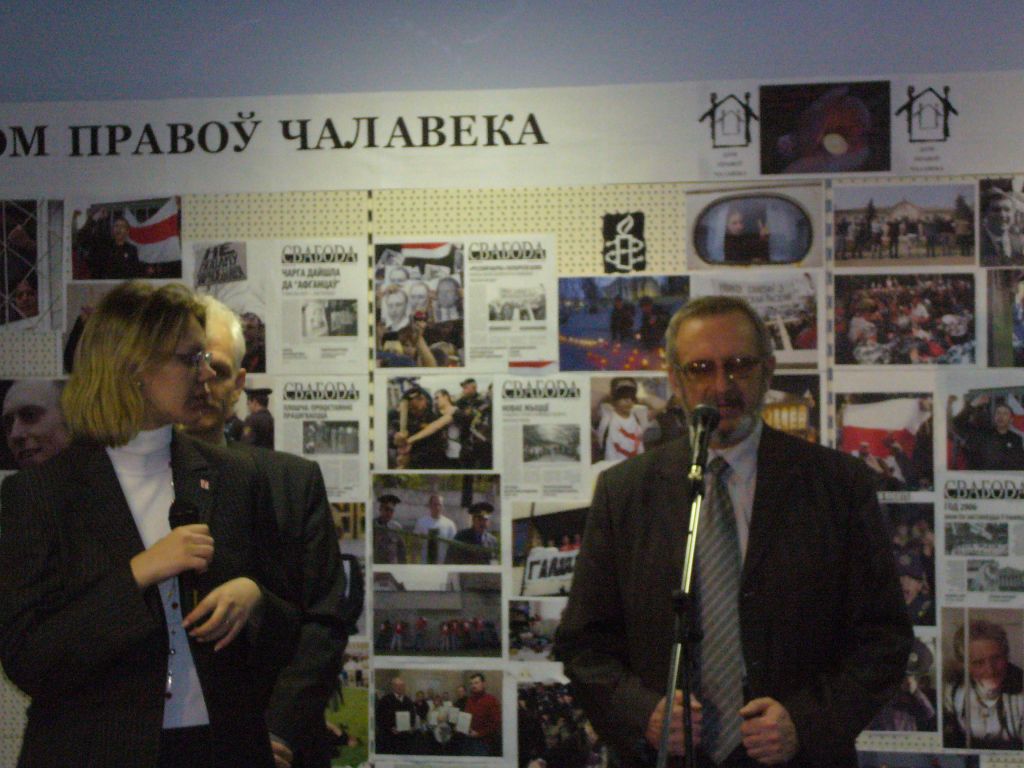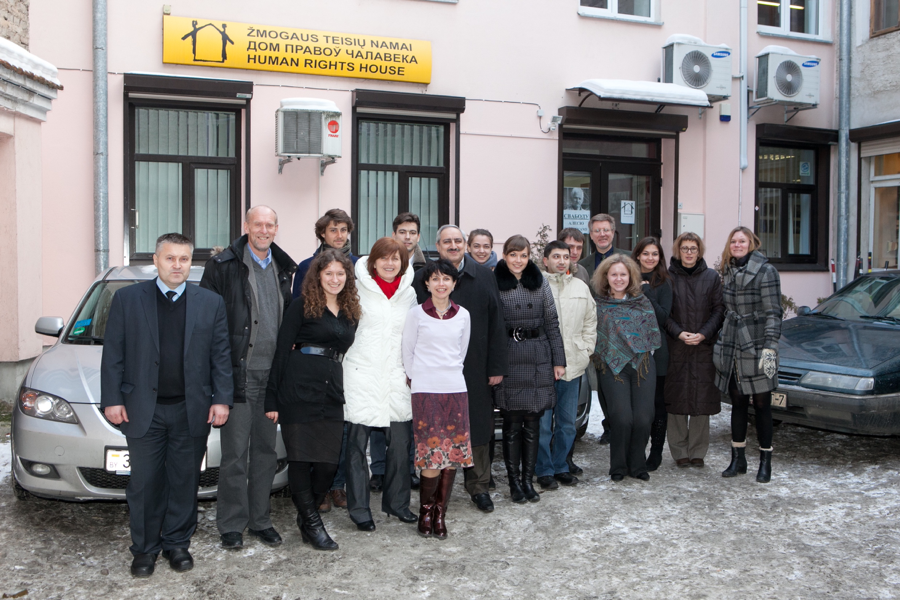“Ten years ago none of us [co-founders] could realise and imagine how this ambitious idea to create the Human Rights House will be implemented and what will be there at the end,” commented Zhanna Litvina, one of the co-founders of the House and board member of the Belarusian Association of Journalists.
Now, ten years on, the Belarusian Human Rights House has achieved a great deal and is essential to the entire human rights community of Belarus. Yet back when the idea was developed, its future was by no means certain, nor was even its location.
The original plan was to establish a House in Minsk, Belarus, but the five-year struggle to do so came to an end in 2006, amid an increasingly dangerous environment for human rights defenders. The government had closed down human rights organisations declaring their activities illegal, and the worsening political climate made establishment of the House or the holding of any substantial gatherings too risky.
Litvina recalled the strong will to create a Belarusian Human Rights House in spite of the difficulty: “The opposition by the Ministry of Justice of Belarus to register us was absolutely predictable. But it did not become an insurmountable obstacle on the way to a dream to have our House and to be together in our House.”
Belarusian human rights defenders still needed a shelter and meeting place to support their activities inside Belarus. With Human Rights House Foundation (HRHF) support, the Belarusian Human Rights House registered in Vilnius, Lithuania, that same year and began operations in 2007.
Tatsiana Reviaka, the current president of the Belarusian Human Rights House, remembers her first encounter with the House:
“My personal story of close relations with the Belarusian Human Rights House began in the summer of 2007, when we started to organise Summer Schools on Human Rights for young people there. Every summer four groups of students were living, learning and resting in the House during ten days. While spending time in the House people started to perceive it as a real home, and we could often hear ‘let’s go home’ – not just into the room where you are temporarily staying, but to your house, to your territory, where there is a piece of Belarus and ‘your people.’”
After the presidential election in Belarus in December 2010, civil society in the country faced intensified repression and around 700 people were arrested, many of them youth activists. The House responded, increasing its role as a shelter for Belarusian human rights defenders under threat.
Since then, it has helped many human rights defenders from further afield through its role as one of the three Human Rights Houses engaged in the Network protection and shelter programme.
Ales Bialiatski, co-founder and head of Viasna, called the House “an island of liberty” at its opening in 2007. After the events of 2010, the House increasingly supported Belarusian human rights defenders, not just as a shelter and training centre, but as a means to counter the repression against them: raising the profile of those arrested, including Ales Bialiatski, producing protest and campaign materials, coordinating joint strategies and solidarity campaigns, and providing a platform to gain international support and speak out internationally against the repression.

Barys Zvozskau, former president of the Belarusian Human Rights House and key to its success, speaking at the opening of the House in 2007
Today, the Barys Zvozskau Belarusian Human Rights House – renamed in August 2013 in honour of its creator, inspirer, and first president Barys Zvozskau (1949-2012) – remains an educational institution for human rights defenders, lawyers, journalists, and civil society activists, which strengthens the capacity of human rights organisations.
However, it is now more than this. Reviaka declared: “Today the House is not only a safe place for the Belarusian human rights defenders to hold different events, which cannot be held in Belarus; it is also a coordinator and organiser of the common processes that are important for the entire human rights community of the country.”
Maria Dahle, Director at HRHF and co-founder of the Belarusian Human Rights House, said: “The House has for 10 years brought sanctuary to Belarusian human rights defenders, creating space and certainty for them to build human rights capacity and develop strategies long term, in spite of the restrictions and threats of working on human rights in an authoritarian country.”
“It has empowered and united Belarusian civil society through cooperation that would simply not have been possible within Belarus, enabling human rights defenders to continue to have an impact on human rights in the country, she added.”

Belarusian human rights defenders meet with close international partners and the UN Special Rapporteur on Belarus, Miklós Haraszti, in 2017 to discuss joint strategies for advocacy.
The Belarusian Human Rights House, together with the founding organisations and colleagues from HRHF, also strengthened efforts to engage in international advocacy, creating a joint voice to promote Belarusian civil society’s agenda in the field of human rights. The House continues to act as a catalyst for Belarusian human rights defenders to develop joint advocacy strategies and positions, and keep Belarus on the international agenda.
Miklós Haraszti, the UN Special Rapporteur on Belarus, works closely with the House and has done so since his mandate was established in 2012; the House, together with HRHF, were instrumental in successfully advocating for the mandate.
Haraszti commented: “I wish the Belarusian Human Rights House all the best for its 10th Anniversary. The fact that this Human Rights House remains in exile is a sad reflection of the reality Belarusian civil society is facing. Their devoted efforts bring closer the day when human rights will be acknowledged in Belarus as the connecting issue of all nations and states, and human rights organisations will be able to operate independently and free from harassment in Belarus’ capital and in its regions.”
“Until that day, I welcome the House’s role as an essential link for Belarusian human rights defenders to the outside world: to international organisations and mechanisms, and to international advocacy,” he added.
Intrinsic to the achievements of the Belarusian Human Rights House is the success of Bring International Standards Home (BISH), an educational programme to train Belarusian lawyers and human rights defenders in international human rights law and mechanisms, which would not have been possible without the House. It has for many years organised and held meetings and trainings for this programme, now in its fourth cycle, as well as for the wider International Law in Advocacy (ILIA) programme that includes lawyers from Belarus as well as from Azerbaijan, Moldova, Russia, and Ukraine. Around 100 Belarusian lawyers and human rights defenders remain in contact with these programmes.

The Belarusian Human Rights House hosts an ILIA coordination meeting in 2012 with HRHF and partners from Azerbaijan, Belarus, Moldova, Poland, Ukraine, and Russia.
—
Monthly newsletter of the Human Rights Houses and HRHF
This article was published as part of the monthly newsletter of the Human Rights Houses and HRHF. Sign up to receive news and insight into human rights issues and country situations, the projects and activities of Human Rights Houses, and portraits and interviews with human rights defenders.
New Human Rights House in Vilnius ‘an island of liberty’
On the 30th of January 2007, the Lithuania-registered Belarusian Human Rights House opened in Vilnius.





